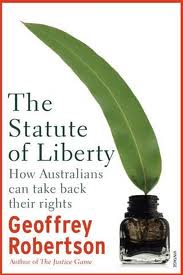Geoffrey Robertson, The Statute of Liberty
 Australia does not have a Bill of Rights, a comprehensive statement setting out the basic rights and freedoms of all its people.“A Statute of Liberty”, says celebrated human rights lawyer Geoffrey Robertson at a Melbourne festival in April,
Australia does not have a Bill of Rights, a comprehensive statement setting out the basic rights and freedoms of all its people.“A Statute of Liberty”, says celebrated human rights lawyer Geoffrey Robertson at a Melbourne festival in April,
…is an idea I wish to celebrate and whose time has come in every advanced democracy in the world.

Geoffrey Robertson QC is Australia’s foremost proponent of a Bill Of Rights. Photo by lewishamdreamer
Australia’s Constitution inherits and retains traditions from British common law, preserving a separation of powers between parliament, its monarch and judiciary. This reflects Australia’s former role as a British colony, he says. Unlike the US, Australia’s constitution does not vest individual rights in personhood. Some guaranteed rights – limited rights to a trial and codified prevention of an official State religion, are explicit but few. They are examples designed to ensure civil liberty as a whole, but do not reflect civil liberties as they apply to individuals: you, me, citizens of Australia.
Parliament has signed many international human rights treaties but these are non-binding. As the High Court Justice Kirby remarked,
New Zealand, South Africa, and Canada have each adopted a Bill of Rights. Even Britain adopted the EU Convention – whole – into its domestic law.
Presently, parliament is virtually unrestricted in passing laws that constrain many rights and freedoms that Australians have come to feel are proper and generally specified in other free societies.
Courts in Australia have interpreted implied rights from some of the terms in its Constitution. There is an implied – though not guaranteed – right to vote. Robertson argues that due to more recent High Court decisions, there is an at least implied freedom to discuss political matters, though nothing that equates to the protections of the US first amendment. Australia’s free speech protection is upheld only against a difficult standard, a level of speech “necessary to maintain the system of representative and responsible government”.
Critics have long argued that judges are ‘unelected’ and that parliament is the peoples’ representative body. Bills of Rights have been put to parliament before however, and been dismissed. It is Robertson’s argument that rights cannot be the prerogative of any one body to endow, but of all bodies to recognise. It is a courts’ proper role, he says, to interpret laws as they apply to individual cases, uniquely placing them with the capacity to recognise cases of injustice.
It may shock many to learn the Constitution does not guarantee equal legal protection. This omission is as antiquated as it was deliberate: many of the constitutional framers rejected proposals that might put an end to existing “colonial laws that limited the employment of Asian workers”. The Constitution also permits to this day specific laws with respect to “the people of any race for whom it is deemed necessary to make special laws.” This racial inequality was encouraged by Edmund Barton, later Australia’s first prime minister. In 1898 Barton argued equal protection clauses, which he disfavoured, would limit the government’s power. In his words, the power was necessary “to regulate the affairs of the people of coloured and inferior races who are in the Commonwealth.”
It is a power incompatible with modern democratic values.
Robertson’s book Statute of Liberty: How Australians Can Take Back Their Rights notes the government has actually defended this position in recent times. It has made use of this adverse provision in overturning many human rights and heritage protections. In Kruger v Commonwealth (1997) for example, the High Court observed its current scope would not have been able to prevent the forcible racial assimilation policies by the government in the last century.
Only in the absence of a Bill of Rights, could a moral injustice such as racially discriminatory laws be overlooked in favour of legal precedent. Such are the limits Statute of Liberty makes clear in regards to common law.
Currently, the Australian state of Victoria (2006) and its Capital Territory (2004) have instituted bills of rights, which have improved policy making and created a dialogue between courts and parliament. Such bills should be encouraged and copied in other states. To prevent them from being encroached or overturned, there should be a federal bill protecting Australians nationally.
Such a bill would recognise rights in personhood, protect against individual rights abuses, and improve Australia’s record in acting on its treaty promises to the international community, says Robertson.
A Bill of Rights would define Australia as a modern nation of individuals, and recognise the distinguishing national character of a people born, and entitled, to live freely ♦
Geoffrey Robertson introduces The Statute of Liberty: How Australians Can Take Back Their Rights in this Radio National excerpt. The book is available from Vintage Books and ABC stores. [Pictures sourced from Flickr Creative Commons]

